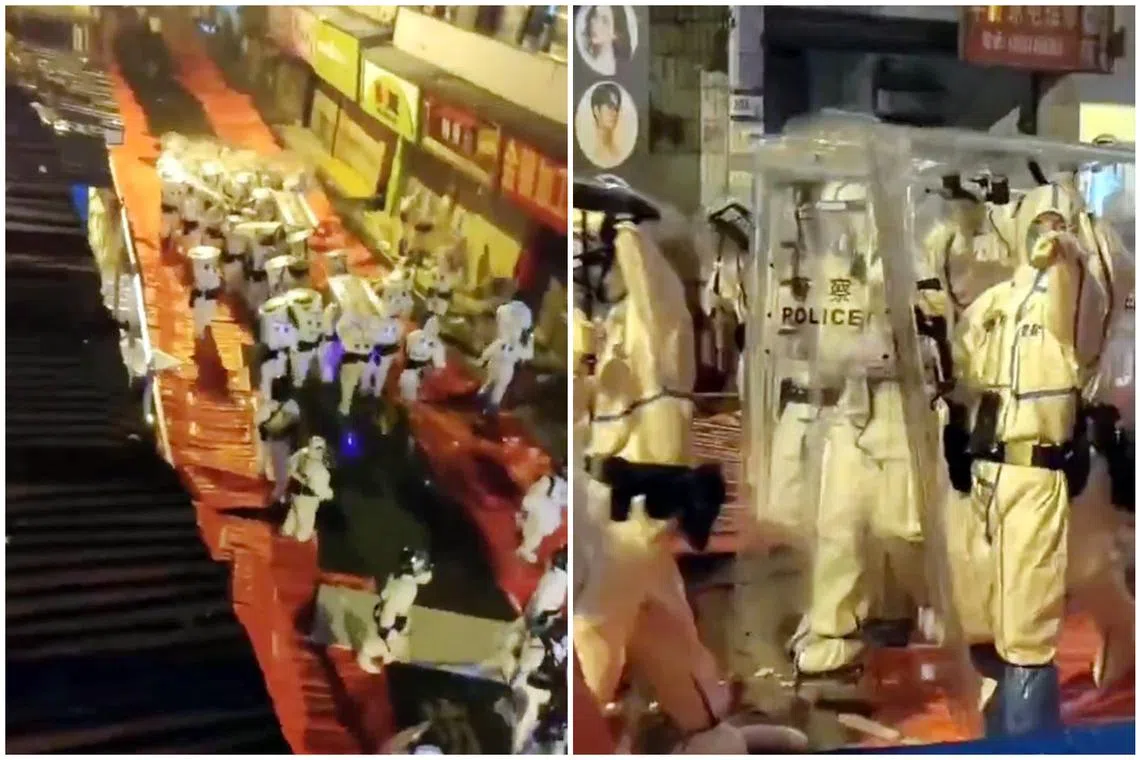Two Chinese cities ease Covid-19 curbs after protests spread
Sign up now: Get insights on Asia's fast-moving developments

The demonstrations have become a show of public defiance unprecedented since President Xi Jinping came to power in 2012.
PHOTO: WHYYOUTOUZHELE/TWITTER
SHANGHAI - The giant Chinese cities of Guangzhou and Chongqing announced an easing of Covid-19 curbs on Wednesday, a day after demonstrators in southern Guangzhou clashed with police
The demonstrations, which spread over the weekend to Shanghai, Beijing and elsewhere, have become a show of public defiance unprecedented since President Xi Jinping came to power in 2012.
The south-western city of Chongqing will allow close contacts of people with Covid-19, who fulfil certain conditions, to quarantine at home, a city official said.
Guangzhou, near Hong Kong, also announced an easing of curbs, but with record numbers of cases nationwide, there seems little prospect of a major U-turn in zero-Covid policy that Mr Xi has said is saving lives.
Some protesters and foreign security experts believe Wednesday’s death of former President Jiang Zemin, who led the country for a decade of rapid economic growth after the Tiananmen crackdown in 1989, might become a new rallying point for protest after three years of pandemic.
Shanghai medical company worker Ray Lei, in his 20s, said Mr Jiang was sometimes compared positively to President Xi, given his skills on the international stage and relative openness to the West.
“So as for Jiang Zemin’s death, we feel a sense of tragedy towards the future of China’s leadership,” said Mr Lei, who took part in protests in Shanghai on Sunday.
Mr Jiang’s legacy was being debated on protesters’ Telegram groups, with some saying it gave them a legitimate reason to gather.
“How similar is history,” read one protester’s post, referring to former party General Secretary Hu Yaobang, whose death in April 1989 was seen as one of the drivers of the nationwide protests that year.
“We can all go onto the streets today and lay chrysanthemums,” another said.
Announcing the lifting of lockdowns in parts of Guangzhou, a city hard-hit by the recent wave of infections, authorities did not mention the protests, and the district where Tuesday’s violence flared remained under tight control.
In one video of those clashes posted on Twitter, dozens of riot police clad in white protective suits and holding shields over their heads, advanced in formation over what appeared to be torn down lockdown barriers as objects flew at them.
Police were later seen escorting away a row of people in handcuffs.
Another video clip showed people throwing objects at police, while a third showed a tear gas canister landing in a small crowd on a narrow street, sending people running to escape the fumes.
Reuters verified that the videos were filmed in Guangzhou’s Haizhu district, the scene of Covid-19-related unrest two weeks ago, but could not determine when the clips were taken or the exact sequence of events and what sparked the clashes.
Social media posts said the clashes took place on Tuesday night and were caused by a dispute over lockdown curbs.
China Dissent Monitor, run by US government-funded Freedom House, estimated at least 27 demonstrations took place across China from Saturday to Monday. Australia’s ASPI think tank estimated 43 protests in 22 cities.
Easing curbs
As well as the easing of curbs in Guangzhou and Chongqing, officials in Zhengzhou - the site of a big Foxconn factory making Apple iPhones that has been the scene of worker unrest over tough Covid-19 restrictions, announced the “orderly” resumption of businesses, including supermarkets, gyms and restaurants.
Earlier, national health officials said China would respond to “urgent concerns” raised by the public and that Covid-19 rules should be implemented more flexibly, according to a region’s conditions.
But while the easing of some measures appears to be an attempt to appease the public, authorities have also begun to seek out those who have been at the protests.
“Police came to my front door to ask me about it all and get me to complete a written record,” a Beijing resident who declined to be identified told Reuters on Wednesday.
Another resident said some friends who posted videos of protests on social media were taken to a police station and asked to sign a promise they “would not do that again”.
Several people gave similar accounts to Reuters on Tuesday.
It was not clear how authorities identified the people they wanted to question, nor how many people authorities contacted.
In a statement that did not refer to the protests, the Communist Party’s top body in charge of law enforcement agencies said on Tuesday that China would crack down on “the infiltration and sabotage activities of hostile forces”.
The Central Political and Legal Affairs Commission also said “illegal and criminal acts that disrupt social order” would not be tolerated.
The foreign ministry has said rights and freedoms must be exercised lawfully.
Covid-19 has spread despite China largely isolating itself from the world and demanding sacrifices from hundreds of millions to comply with relentless testing and isolation.
While infections and death numbers are low by global standards, analysts say that a reopening before increasing vaccination rates could lead to widespread illness and deaths.
The lockdowns have hammered the economy, disrupting global supply chains and roiling financial markets.
Data on Wednesday showed China’s manufacturing and services activity for November posting the lowest readings since Shanghai’s two-month lockdown began in April. REUTERS


